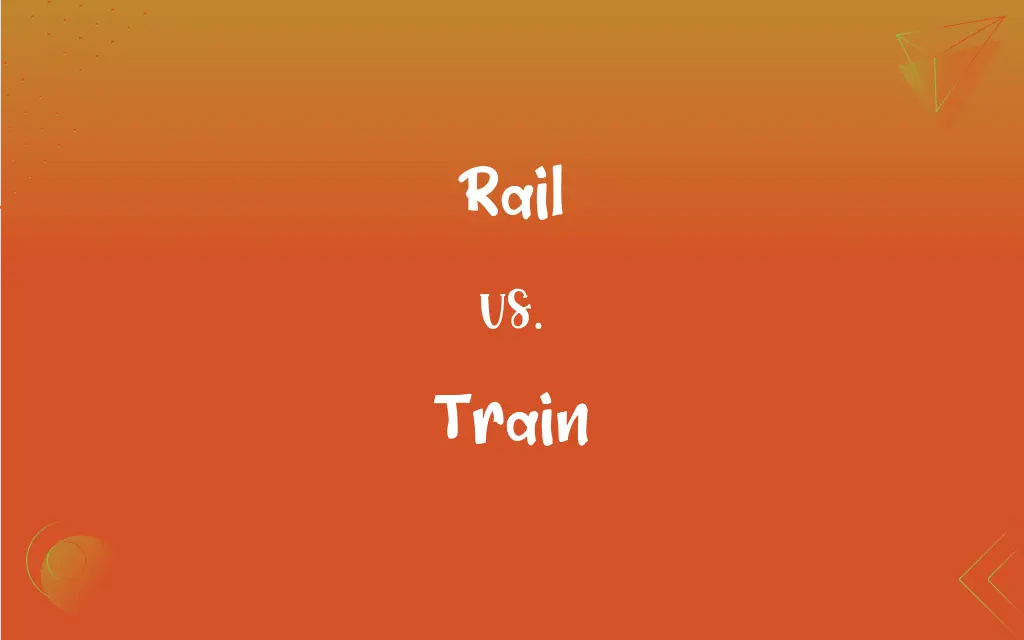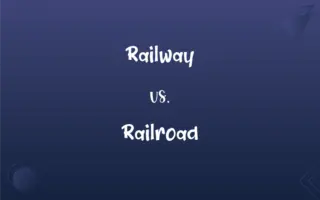Rail vs. Train: What's the Difference?
Edited by Janet White || By Harlon Moss || Updated on October 16, 2023
Rail refers to the tracks on which vehicles, often trains, run; a train is a series of connected vehicles that move on these tracks.

Key Differences
Rail and train are terms commonly used in transportation, each holding a distinct meaning. A rail refers to the metal tracks on which a train travels. In essence, the rail provides the pathway, a stable and predefined route, for the train. Conversely, a train is a series of interconnected vehicles that move along these rails, transporting passengers or goods from one place to another. While the rail remains static and serves as a foundation, the train is dynamic, moving upon the rail to reach its destinations.
When considering infrastructure and installation, rails require significant planning and construction effort. Rails must be evenly laid, often across vast distances, and are essential for the safe and smooth operation of trains. Trains, on the other hand, are the mobile assets that utilize this infrastructure. Comprised of multiple cars or wagons, a train is orchestrated to function seamlessly on the rails, ensuring the timely and efficient movement of people or cargo.
From a maintenance perspective, both rails and trains need regular checks, but for different reasons. Rails are subjected to wear and tear due to the constant movement of heavy trains over them. Regular inspections ensure that the rails remain straight, devoid of any cracks or defects, providing a safe pathway for trains. Trains, meanwhile, require maintenance to ensure their mechanical and operational integrity. Everything from the engine to the brakes and the passenger compartments in a train must be in optimal condition for safety and efficiency.
In the context of travel and commerce, rails and trains play complementary roles. Rails, once installed, become a permanent fixture, delineating specific routes that can bridge cities, countries, or even continents. Trains, utilizing these rails, offer a mode of transportation that can be both time-efficient and environmentally friendlier than some other methods. The symbiotic relationship between rail and train has been pivotal in shaping economies, fostering trade, and connecting communities.
In essence, while rail and train are terms deeply intertwined, they represent different facets of railway transportation. The rail, as the foundational track, lays the groundwork, literally and figuratively, for the operation of the railway system. The train, as the moving entity, brings this system to life, enabling the tangible benefits of rapid transit, commerce, and connectivity. Both are integral, each serving its unique purpose in the realm of rail transportation.
ADVERTISEMENT
Comparison Chart
Definition
Tracks or bars for vehicles to move on
Series of connected vehicles for transportation on rails
Purpose
Provide infrastructure for movement
Convey people or cargo
Dependency
Can exist without trains but serves little purpose
Requires rails to operate
Represents
Infrastructure
Mode of transportation
Usage in Transportation
Refers to the overall system (e.g., rail transportation)
Specific vehicles (e.g., freight train, passenger train)
ADVERTISEMENT
Rail and Train Definitions
Rail
A track or set of tracks made of steel.
The rail was laid down to connect the two towns.
Train
A long piece of flowing material attached to clothing, especially a dress.
Her wedding gown had a beautiful lace train.
Rail
A means of conveyance using tracks.
The city plans to expand its rail system in the next decade.
Train
A series of connected vehicles traveling on railways.
The train to Chicago departs at 3 PM.
Rail
A barrier or fence made with metal or wooden bars.
He leaned against the rail, looking at the river below.
Train
To instruct or teach in a particular skill or type of behavior.
She trains athletes for the Olympic games.
Rail
One of the parallel bars on which trains run.
The construction crew worked diligently to fix the broken rail.
Train
A process or set of processes to achieve a particular result.
He went through a rigorous train of therapies for recovery.
Rail
The system of transport that uses trains.
Rail travel has always been her preferred mode of transportation.
Train
The movement of following something in a line.
A train of ducks followed their mother across the pond.
Rail
A bar extending horizontally between supports, as in a fence.
Train
A series of connected railroad cars pulled or pushed by one or more locomotives.
Rail
A structure made of such bars and supports and forming a barrier or guard; a railing.
Train
A long line of moving people, animals, or vehicles.
FAQs
Can a train operate without rails?
No, conventional trains require rails to operate.
What is the primary function of a rail?
The primary function of a rail is to provide tracks on which vehicles, usually trains, can move.
What materials are typically used to make rails?
Rails are typically made of steel.
Can rails be used for vehicles other than trains?
While primarily for trains, rails can also support trams and some specialized vehicles.
What do we mean by "rail system"?
"Rail system" refers to the complete infrastructure, including tracks, stations, and the vehicles that run on them.
How do high-speed trains differ from regular trains?
High-speed trains are designed for faster speeds, often exceeding 155 mph, and require specially designed rails.
Why are rails made to be so straight and level?
Straight and level rails ensure smoother, safer, and more efficient train travel.
Can the word "train" also refer to a procession of things?
Yes, "train" can refer to a succession or series of things, like a train of thoughts.
Are there different types of trains?
Yes, there are freight trains, passenger trains, subways, trams, and more.
How is "train" used in the context outside of transportation?
"Train" can mean to instruct or teach, or it can refer to a trailing part of a gown or robe.
What's the difference between a subway and a train?
A subway is a type of train that runs primarily underground in urban areas.
How do trains get their power to move on rails?
Trains can be powered by diesel engines or electricity from overhead lines or third rails.
What is "light rail"?
Light rail is a form of passenger urban rail transit with a lighter capacity compared to heavy rail or metro systems.
Why is maintenance important for rails?
Regular maintenance ensures rails remain safe and functional for train operations.
How do trains stop at designated stations?
Trains use a combination of air brakes and friction brakes to come to a stop.
Are all trains designed to carry passengers?
No, some trains, like freight trains, are designed to transport goods.
Why are there gaps between sections of rail tracks?
Gaps, or expansion joints, allow for rails to expand and contract with temperature changes.
How do rails support the heavy weight of trains?
Rails are made of strong materials, like steel, and are supported by ties and ballast, distributing the train's weight.
Can "rail" also refer to a fence or barrier?
Yes, a rail can mean a barrier or fence made of metal or wooden bars.
Can you "train" someone in a skill?
Yes, to "train" can also mean to teach or instruct someone in a particular skill.
About Author
Written by
Harlon MossHarlon is a seasoned quality moderator and accomplished content writer for Difference Wiki. An alumnus of the prestigious University of California, he earned his degree in Computer Science. Leveraging his academic background, Harlon brings a meticulous and informed perspective to his work, ensuring content accuracy and excellence.
Edited by
Janet WhiteJanet White has been an esteemed writer and blogger for Difference Wiki. Holding a Master's degree in Science and Medical Journalism from the prestigious Boston University, she has consistently demonstrated her expertise and passion for her field. When she's not immersed in her work, Janet relishes her time exercising, delving into a good book, and cherishing moments with friends and family.































































